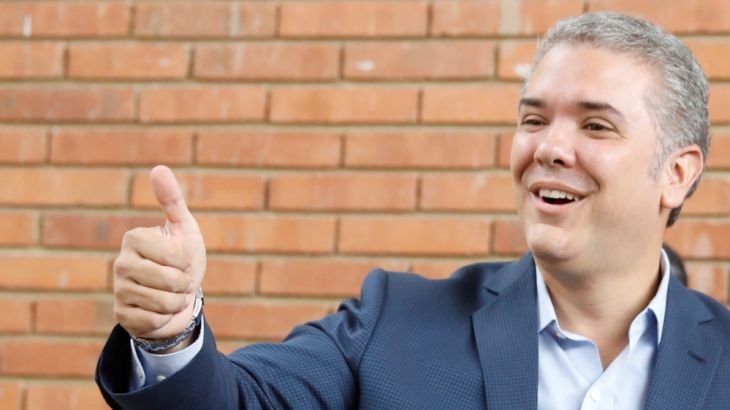Who is Ivan Duque, Colombia’s president-elect?
The 41-year-old protege of former President Uribe has promised to make changes to the 2016 peace deal with the FARC.

Conservative Ivan Duque has won the first presidential election in Colombia since the 2016 peace deal with the Revolutionary Armed Forces of Colombia (FARC) rebels.
The 41-year-old protege of former President Alvaro Uribe has promised to make changes to the landmark deal, casting a level of uncertainty over the peace process, which formally ended more than 50 years of conflict with the rebel group.
Keep reading
list of 4 itemsTunisian lawyer arrested during live news report
Vladimir Putin sworn in for fifth term as Russian president
What’s at stake in Chad’s presidential election?
Duque is the son of a former governor and energy minister, and has been interested in politics from a young age.
Oscar Castano, a childhood friend, recalled how a young Duque would wake up by 5am and read the politics section of the local newspaper.
He memorised speeches of Colombian political luminaries, and debated with lawmakers on the left and right who passed through his house.
Duque holds a law degree and a major in Philosophy and a Master’s in Public Policy Management from Georgetown University in Washington, DC.
His career started in 1999 as a consultant, and he later served as an adviser at the Colombian Ministry of Finance.
Duque also served a period as international adviser of Uribe, and from 2001 to 2013, he was a senior adviser at Inter-American Development Bank.
Uncertainty over FARC deal
Duque is supported by Uribe, one of the FARC peace accord’s fiercest critics for its perceived soft judicial treatment of “FARC terrorists”. Duque says his party “does not want to tear the agreement to shreds” but rather “make it clear that a Colombia at peace is a Colombia where peace meets justice”.
Duque has openly criticised current President Jose Manuel Santos, particularly his handling of the peace process, describing it as “a monument to impunity” and the way the relations with Venezuela has been handled.
“I have always said that it’s not about destroying or ripping up the accords, but about making significant changes to the elements that affect the rule of law,” Duque told Spanish Newspaper, El Pais.
Tensions over the deal became apparent in the immediate aftermath of Duque’s victory after the president-elect lost no time in pledging “corrections” to the peace deal.
“That peace we long for – that demands corrections – will have corrections, so that the victims are the centre of the process, to guarantee truth, justice and reparation,” Duque told supporters in his victory speech at his campaign headquarters.
“The time has come to build real change,” Duque said, promising a future for Colombians “of lawfulness, freedom of enterprise and equity”, after decades of conflict.
It remains unclear what changes Duque can and will make to the agreement.
He has said he wants to keep ex-FARC rebels from serving in Congress. The agreement allowed the group to transform itself into a political party.
I have always said that it's not about destroying or ripping up the accords, but about making significant changes to the elements that affect the rule of law.
Critics fear Duque will be little more than a puppet of former President Uribe, but those in the business community welcome his economic policies.
“He thinks that we need to keep growing. That we need to insert ourselves in the international economic networks and that we need to bring more money to the country and more progress conceived in economic terms,” Sandra Borda, a political analyst told Al Jazeera.
A lot is at stake for Colombia’s $324bn economy, he has promised to keep investors happy by cutting business taxes, bolstering the oil and coal sectors – top exports – and helping manufacturers.
Duque has vowed to close the poverty gap, simplify the country’s tax code and pursue the complete eradication of coca in line with his tough stance on drugs.